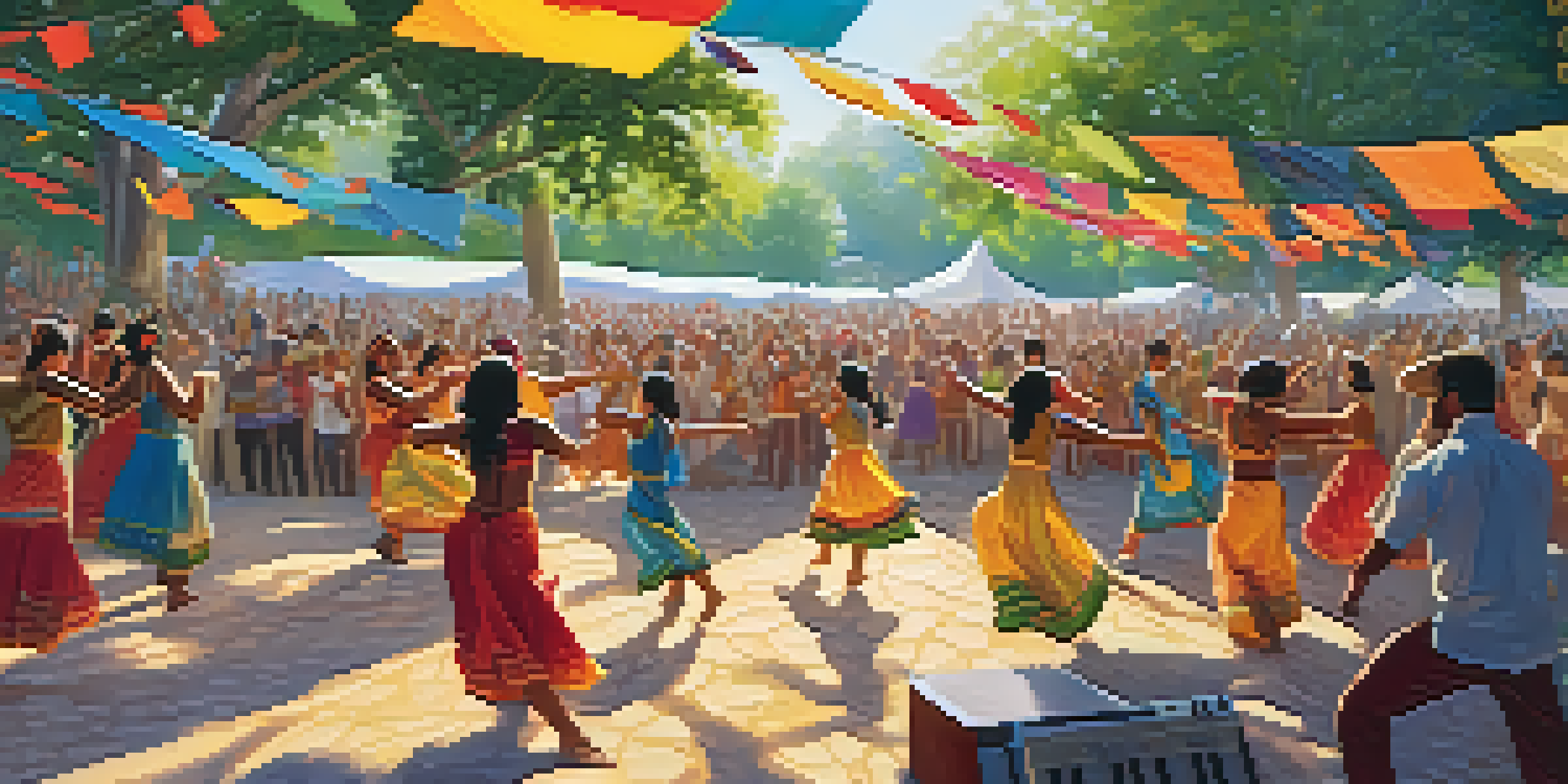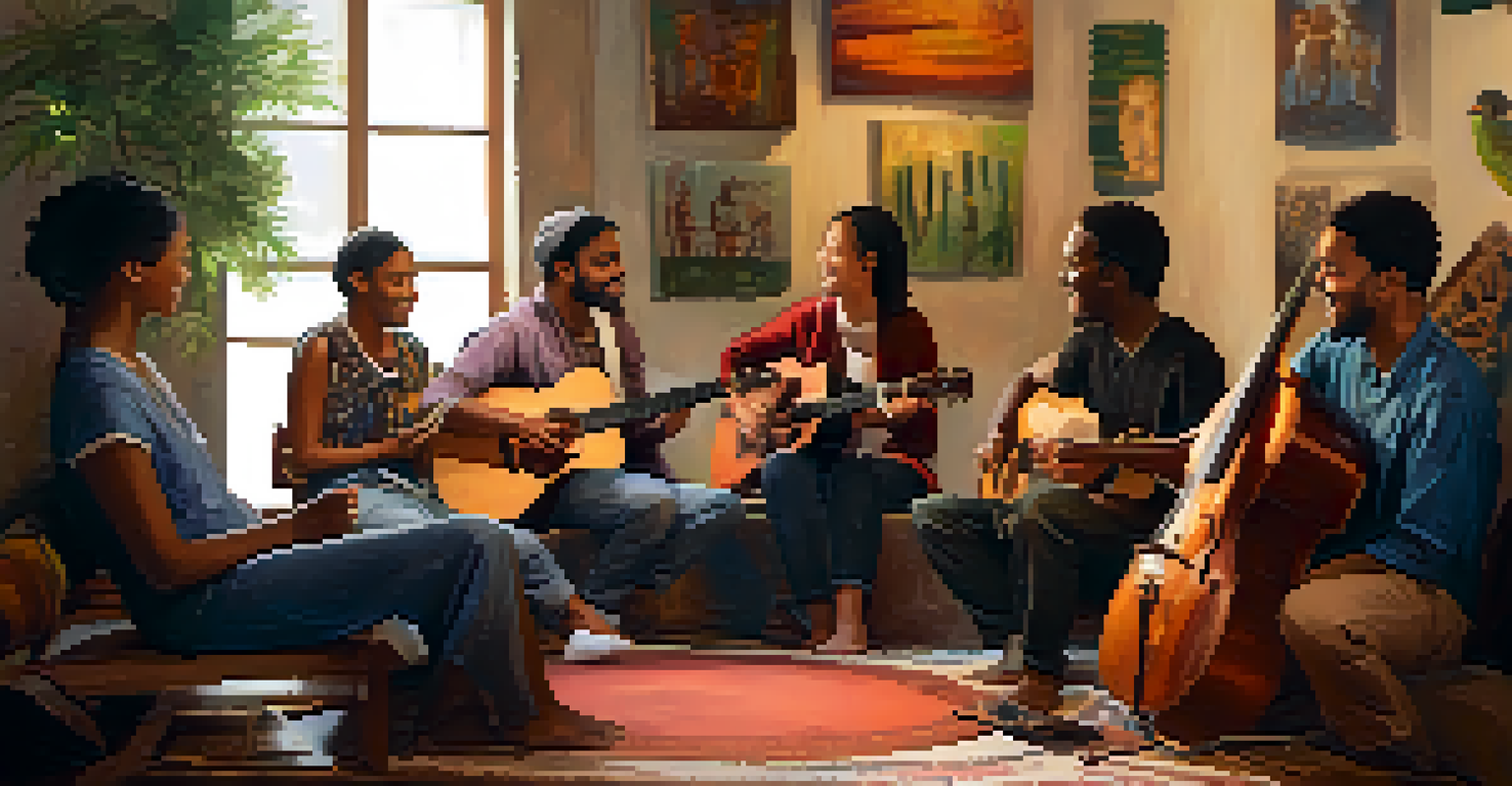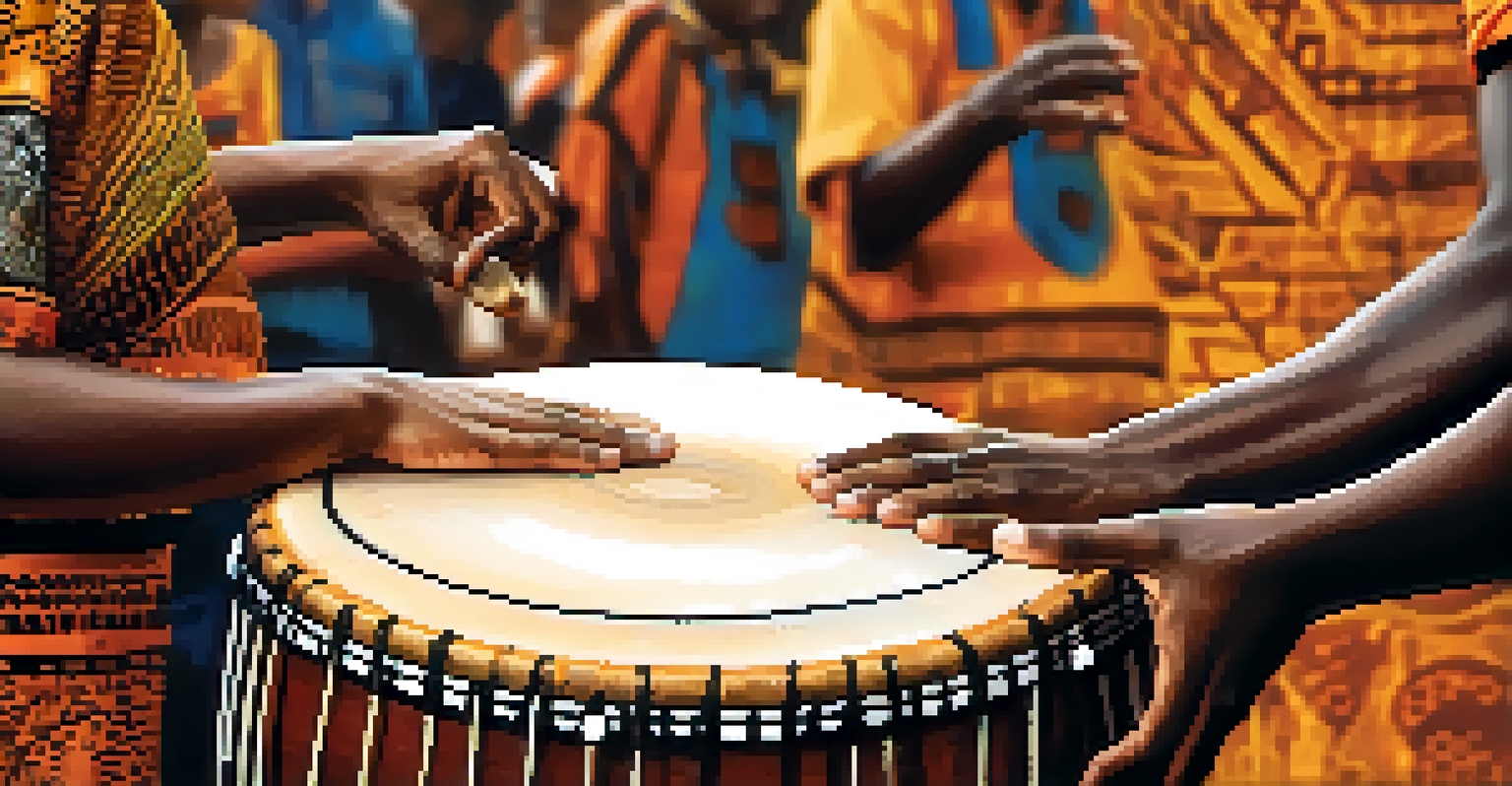The Role of Music in Promoting Cultural Inclusivity

Music as a Universal Language for Connection
Music has the unique ability to transcend language barriers and connect people from diverse backgrounds. When we listen to a melody, the emotions it evokes can be felt universally, regardless of the words being sung. This common ground fosters a sense of understanding and unity among people who might otherwise feel distant from one another.
Music can change the world because it can change people.
For instance, consider how songs from different cultures can resonate with listeners across the globe. A heartfelt ballad from Africa or a lively samba from Brazil might stir feelings of joy or nostalgia in someone who has never visited these places. This shared experience through music can create bonds that encourage cultural inclusivity.
By participating in music-making, whether through singing, dancing, or playing instruments, individuals can collaborate and share their unique cultural narratives. This collaborative spirit strengthens community ties and promotes an appreciation for the rich tapestry of human expression.
The Role of Music in Cultural Education
Music serves as an excellent educational tool, helping people learn about different cultures in an engaging way. Through songs, we can explore history, traditions, and values that shape a particular society. This understanding can break down stereotypes and foster empathy towards those who may seem different at first glance.

For example, in schools, incorporating music from various cultures into the curriculum can spark students' interest and curiosity about the world. Learning a traditional dance or song can lead to discussions about the culture's history, beliefs, and customs. Such experiences promote inclusivity by encouraging respect for diverse perspectives.
Music Fosters Cultural Connection
Music transcends language barriers, creating a universal bond that connects people from diverse backgrounds.
Furthermore, music festivals that celebrate different cultural heritages provide an immersive experience for attendees. These events allow people to engage with music from around the world, promoting cultural exchange and understanding among participants of all backgrounds.
Music and Its Role in Social Movements
Throughout history, music has played a crucial role in social movements advocating for cultural inclusivity and equality. Songs have the power to inspire action, unite individuals, and amplify voices that may otherwise go unheard. This connection between music and activism highlights its importance in promoting social change.
Where words fail, music speaks.
Take, for example, the civil rights movement in the United States, where songs like 'We Shall Overcome' became anthems of hope and resilience. These tunes not only rallied supporters but also communicated the struggles and aspirations of marginalized communities. Such music fosters solidarity and encourages collective efforts toward inclusivity.
Today, artists continue to use their platforms to address issues of social justice and cultural representation. By creating and sharing music that reflects their experiences, these musicians contribute to a broader dialogue about inclusivity, inspiring listeners to reflect on their own roles in promoting social change.
The Healing Power of Music Across Cultures
Music has long been recognized for its therapeutic effects, offering solace and healing to individuals from various cultural backgrounds. This universal aspect of music can help bridge gaps and foster inclusivity, as people come together to share their stories of struggle and triumph. The act of creating or experiencing music can be a powerful tool for emotional healing.
For instance, community music therapy programs often bring together individuals from different cultures to participate in group music-making. These sessions provide a safe space for participants to express their emotions and build connections with one another. The shared experience of creating music can foster understanding and acceptance among diverse groups.
Music as an Educational Tool
Through music, we can learn about different cultures, breaking down stereotypes and fostering empathy.
Moreover, traditional healing practices in many cultures often incorporate music as a form of therapy. This highlights the significance of music in addressing emotional and psychological well-being, reinforcing its role in promoting cultural inclusivity through shared healing experiences.
Celebrating Diversity Through Musical Fusion
Musical fusion is a beautiful representation of cultural inclusivity, where different musical styles and traditions blend to create something entirely new. This creative collaboration showcases the richness of diverse cultures and promotes a sense of appreciation for various musical heritages. It highlights how music can be a space for innovation and connection.
Consider the global popularity of genres like Reggaeton, which combines elements of reggae and Latin music, or Afrobeat, which merges African rhythms with jazz and funk. These genres not only bring together diverse influences but also invite listeners from different backgrounds to celebrate their uniqueness. This blending of styles fosters a sense of belonging and inclusivity.
Concerts and collaborations featuring artists from different genres and cultures further exemplify this fusion. When musicians come together to create and perform, they not only entertain but also promote understanding and acceptance, demonstrating the power of music in bridging cultural divides.
The Impact of Technology on Cultural Music Sharing
In our digital age, technology has revolutionized how we share and experience music from different cultures. With just a few clicks, we can access a vast array of musical genres and styles from around the globe. This accessibility promotes cultural inclusivity by allowing people to explore and appreciate diverse musical traditions without the need for physical travel.
Streaming platforms and social media have made it easier for artists to share their music with a global audience. As a result, listeners can discover and support musicians from various backgrounds, fostering a sense of community and cultural exchange. This interconnectedness encourages a more inclusive appreciation of music.
Technology Enhances Music Sharing
Digital platforms have revolutionized how we access and share diverse musical traditions, promoting cultural inclusivity.
Moreover, technology enables collaborations between artists from different parts of the world, resulting in innovative and unique musical creations. These partnerships not only enhance the diversity of music available to listeners but also promote inclusivity as artists learn from and celebrate each other's cultural backgrounds.
Conclusion: Music as a Catalyst for Cultural Inclusivity
In conclusion, music serves as a powerful catalyst for promoting cultural inclusivity. It connects people across boundaries, educates us about different cultures, and facilitates healing and understanding. By embracing the diverse forms of music that exist in our world, we can foster a greater sense of belonging and appreciation for one another's experiences.
As we continue to explore the role of music in our lives, it's essential to recognize its potential to bridge divides and celebrate diversity. Whether through listening, creating, or participating in musical events, we can actively contribute to a more inclusive society.

Ultimately, music is not just a form of entertainment; it is a vital tool for cultural connection and understanding. By embracing the power of music, we can work together to build a more inclusive world where everyone feels valued and heard.